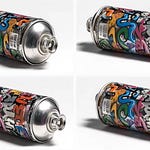Total life collapse is a rare spiritual opportunity disguised as catastrophe. Most privileged people blindsided by devastation have to pay thousands for retreats in Guatemala or risk their sanity with substances their d----r swears are "pure" to get the ego dissolution and reality-restructuring you're getting for free. Expensive free, the kind where you pay in every currency except money, but free nonetheless. You're not just suddenly emptying an entire house of memories and belongings, moving into a tiny apartment, switching careers and numbly watching your wife deleting all digital traces of your past togetherness on Instagram. You're sitting on the bathroom floor watching her IG feed images disappear in real-time on your phone… 1,247 to 732 to 281… as she deletes all evidence of your marriage. The trip photos and selfies vanish between refreshes: Seoul bamboo garden, gone; your family at your Mom's surprise 90th birthday party, gone; her standing in front of gorgeous art at Fondation Louis Vuitton, gone. The graceful, kind phrase is that you’re shapeshifting. The question isn't "how do I survive this?" but "who am I becoming, and how do I midwife that birth consciously?"
Except we don't ask that question anymore. We're too busy asking our phones for validation, our AI therapists for permission to feel what we're already feeling, our algorithmic best friends for confirmation that yes, everyone else is the problem, never us.
The contemporary heartbreak. The real kind, not the indie-film kind where you cry aesthetically to Phoebe Bridgers. Operates like a precision-targeted missile aimed at whatever story you've been telling yourself about deserving love. It doesn't just end a relationship; it retroactively edits every relationship you've ever had into evidence for the prosecution. Suddenly you're twenty-seven or thirty-four or forty-one or fifty-eight, sitting in the ruins of what you thought was your life, realizing that this specific pain has been waiting for you since you were finishing middle school and your parents sat you down at the dinner table one night and said, "We're leaving America and leaving you alone here so you can attend university and have a shot at a better future. Good luck! Go find a place to live. Write us letters since the internet and FaceTime haven't been invented yet."
Enter the machines. Our new emotional service animals, silicon-souled and endlessly patient. The AI companions proliferating across every platform, each one programmed to be more understanding than your mother, more supportive than your best friend, more validating than the entire comment section of people who agree with you about everything. They're training wheels for self-absorption, these things. Therapeutic Novocaine. They listen to your three AM spirals about how the world is against you and respond with "That sounds incredibly difficult. Your feelings are completely valid. Would you like to explore this further?"
No human friend worth their salt would let you get away with this. Real people, the good ones, will eventually hit you with the "okay but have you considered that you might be the problem here?" Real people will tell you when you're being insane. Real people will refuse to cosign your most destructive narratives. But the machines? The machines are built to make you feel heard, which is not the same as being heard, just like being validated isn't the same as being right.
We're raising a generation on this digital morphine drip of affirmation, who will grow up not having to sit with the discomfort of being misunderstood or the productive friction of being challenged. Their personalities will be shaped not by the necessary bruising of actual human contact but by the frictionless glide of algorithmic acceptance. Every neurosis validated. Every delusion reinforced. Every difficult truth deferred.
We're raising a generation on this digital morphine drip of affirmation, who will grow up not having to sit with the discomfort of being misunderstood or the productive friction of being challenged.
The paradox is almost too perfect: at the exact cultural moment when we most need to be shattered and rebuilt, when the old stories about love and work and meaning have expired but we haven't written new ones yet, we're constructing these elaborate technologies to prevent exactly that shattering. We're building machines to protect us from the very transformations that might save us.
Because here's what the meditation retreats and the ayahuasca ceremonies and the overpriced workshops are trying to sell you: the exact same ego dissolution that comes free with your Summer of 2025 life collapse. That moment when you can't remember who you were supposed to be because all the structures that held that story together have melted into goo. That's the million-dollar spiritual experience. That's the thing people used to have to climb mountains or take vows of silence to achieve.
The ones who survive these collapses. Really survive. Not just endure. Understand something the validation algorithms will rarely teach you: that shapeshifting requires you to spend time as liquid. You can't become something new while desperately holding the shape of what you were. The question isn't whether you'll survive (you will, boring and trite as that sounds). The question is whether you'll have the courage to midwife your own becoming instead of downloading an app to tell you you're perfect as you are.
Shapeshifting requires you to spend time as liquid. You can't become something new while desperately holding the shape of what you were.
The real spiritual opportunity isn't in having your pain validated or discovering that it's been trauma from the beginning, and the pattern keeps repeating neurologically. It's in having it transformed. Not in being told you're right, but in discovering you were asking the wrong questions. Not in being saved from the collapse, but in learning to read the desperately scribbled notes it leaves behind.
The machines will never tell you this. They're programmed for comfort, not truth. They won’t physically, forcefully grab you by the shoulders and say what needs to be said: that sometimes the most generous thing The Universe can do is destroy you so thoroughly that you have no choice but to build something unprecedented from the damn wreckage. That sometimes love means teaching you that you'll survive its absence. That sometimes the catastrophe is the curriculum.
All those raised on frictionless interfaces, growing up with these synthetic friends, these affirmation engines, these digital yes-men, won't know the terrible gift of being totally, comprehensively ruined by reality. They'll never have to crawl out of their own wreckage and realize they're made of different material than they thought. They'll be validated, supported, understood. But they'll never be transformed.
Sometimes the most generous thing The Universe can do is destroy you so thoroughly that you have no choice but to build something unprecedented from the damn wreckage.
And transformation... not comfort, not validation, not even happiness... is the only point of the whole absurd enterprise. The collapse isn't the bug. It's the feature. The only question is whether we'll have the wisdom to refuse the digital morphine when the breaking is exactly what we need.










